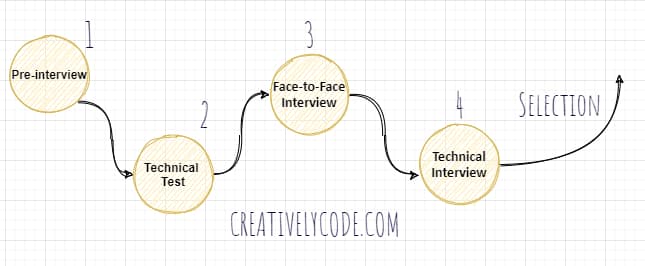I've been both an interviewee and interviewer.
It wasn't until I became a manager myself, that I could had a glimpse into which candidates are selected. The candidates which stood out were those who had prepared, and you would be surprised to know how many didn't!
In this article, I will share my experience with you and hopefully leave you taking away something that will help you find your first tech role job
How should you prepare for a tech interview? Before the interview, you should have a thorough understanding of the target company, job requirements and interview process. This preparatory work plays a decisive role in the success or failure of the interview. Let's look at the following aspects, I believe it can help you solve most of the problems of job hunting.
Three are three cornerstones of interview success: Ability, Mentality and Communication.
| Ability | Attitude | Communication |
|---|---|---|
| Your technical skills, knowledge of programming languages/frameworks, software design, problem solving, algorithms, debugging, software development methodologies. | Confidence, likeability, humorous. | Clear communication, articulate, language skills |
These are the key points you need to demonstrate during your interview.
The best way to prove yourself is with evidence. Show how your previous work experience supports the three cornerstones.
Ability:
- Produce and memorize a list of the frameworks and their features and nuances.
- Talk about your GitHub and personal projects.
- What technical scenarios required action on your part to overcome?
- If you cannot answer a question directly, propose idea for you would attempt proactively, for example, doing online research, asking colleagues.
- If you’ve already worked or done an internship, what were your previous technical successes? Even if the role was not related to coding.
Attitude:
- Ensure you go in with a smile.
- Prepare for questions designed to stress you.
- Whatever happens be yourself.
- Some lighthearted (appropriate) humor rarely goes amiss.
Communication:
- Prepare a short and distinctive self-introduction in advance, mainly describing your technical expertise and educational/professional history.
- When you do not hear or understand a question clearly, do not force yourself to answer, but ask the interviewer to clarify.
- Pay attention to your micro-expressions, do not frown, fidget, speak too fast.
- Do not interrupt the interviewer. (unless important)
The Selection Process
There are 4 key stages to the tech interview process.
Pre-Interview -> Technical Test -> Face-to-Face Interview ->Technical Interview

1. How to prepare for the pre-interview
In my experience, the pre-interview is normally a call set by HR to quickly get a gist of the candidate's situation before progressing them to a face-to-face interview.
The key at this stage is to prove that you're a nice guy, have the necessary language skills and meet the position's requirements.
2. Preparing for the technical test
Some companies will conduct a written test before the pre-interview and some afterwards.
It may require handwriting some small algorithms, such as sorting and string processing.
It’s not the end of the world if it goes wrong. You can still give your interviewers reassurance in the face-face by explaining transparently where you went wrong and what you would do differently if you have additional time, resources.
3. Preparing for the face-to-face interview
- How you wish to grow in the company
- The reason for leaving your previous company
- Do you code on the side, attend meet ups, have personal projects?
- Your values
Some companies may multiple face-to-face interviews, which may even be cross-departmental, in order to gather a selection of opinions.
Often Interviewers will be your colleagues, so ensure you come across as someone they would like to work with.
4. Preparing for a technical face-to-face interview
- Expect to be questioned on trivia concerning the frameworks you have knowledge of.
- If you can’t answer a technical question, demonstrate your thought process and how you will troubleshoot using tools such as Stack Overflow, (and asking your colleagues).
- As the interviewers for this interview will often be your direct future colleagues, show your commitment to the team and what you hope you hope to bring.
- Geek out on coding trivia and personal projects.
There are a few other points which I've consistent found will set you apart from the competition!
Have a career plan in mind
Discussing your personal growth and how you hope to contribute to the employer not just now but in the future will undoubtedly impact on the selection process.
Generally speaking, engineers have two directions of professional travel:
- Technical direction
- Management direction
| Direction | Roles |
|---|---|
| Technical direction: | Senior engineer Technical expert Research scientist |
| Management direction: | Team lead Scrum Master Product manager |
The traveler on the technical path focuses on cultivating technical skills, troubleshooting difficult problems and consolidating their mastery. It requires a strong curiosity and a commitment to life-learning learning.
The management series focuses on team motivation and management of resources to advance the team's goals. There is an emphasis on communication and interpersonal collaboration.
Discussing what you bring and how you wish you build on skills in order to potentially pursue a particular path will benefit you greatly. In practice, there is no obvious boundaries between these two directions, in many cases necessary skills will overlap.
Hard Skills vs Soft Skills
Interviewers are going to be looking at both hard and soft skills.
Hard skills include the mastery of basic knowledge, past project experience, the ability to design system architecture, and the comprehensive application of different framework tools.
Soft power includes communication and writing skills, time keeping, creativity and empathy, among others.
How to Target your Interview Preparation
Do your homework on the company and its values, see what it offers in terms of benefits, mentioning those will score you a lot of points.
1. Research potential interview questions on Glassdoor.com
Glassdoor is a platform where users review their experiences with various companies, that includes interviews (regardless of whether they got the job or not). In many case, they'll list out the questions they received in their interviews.
Head over to the Glassdoor page for the company your interviewing for, select interviews and copy the questions people have listed over to a separate document.
From there you can think about your answers for each one. I prefer to write them out and even take notes to potentially have on hand during the actual interview.
You may receive the same questions as listed by other users. Try to leverage the user-driven data on Glassdoor and identify other recruitment processes in order to best prepare for the big day.
